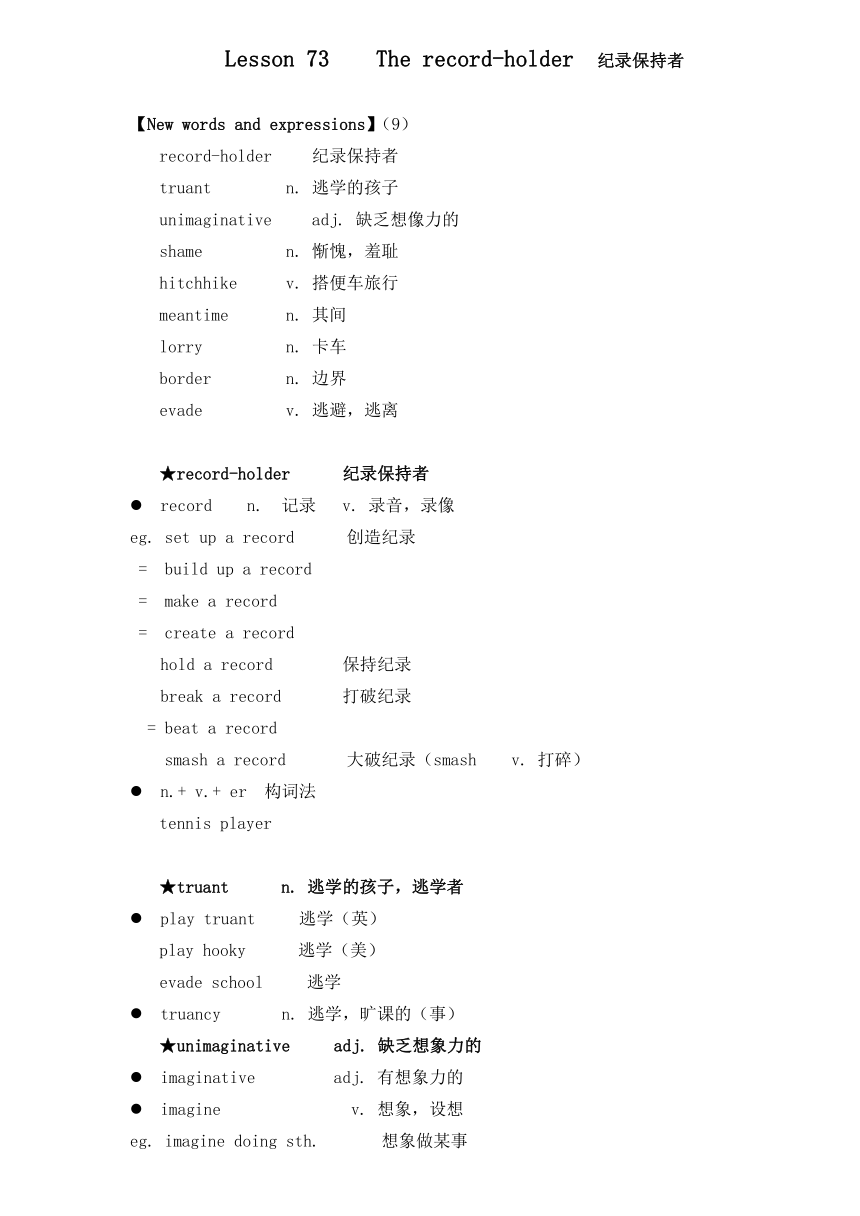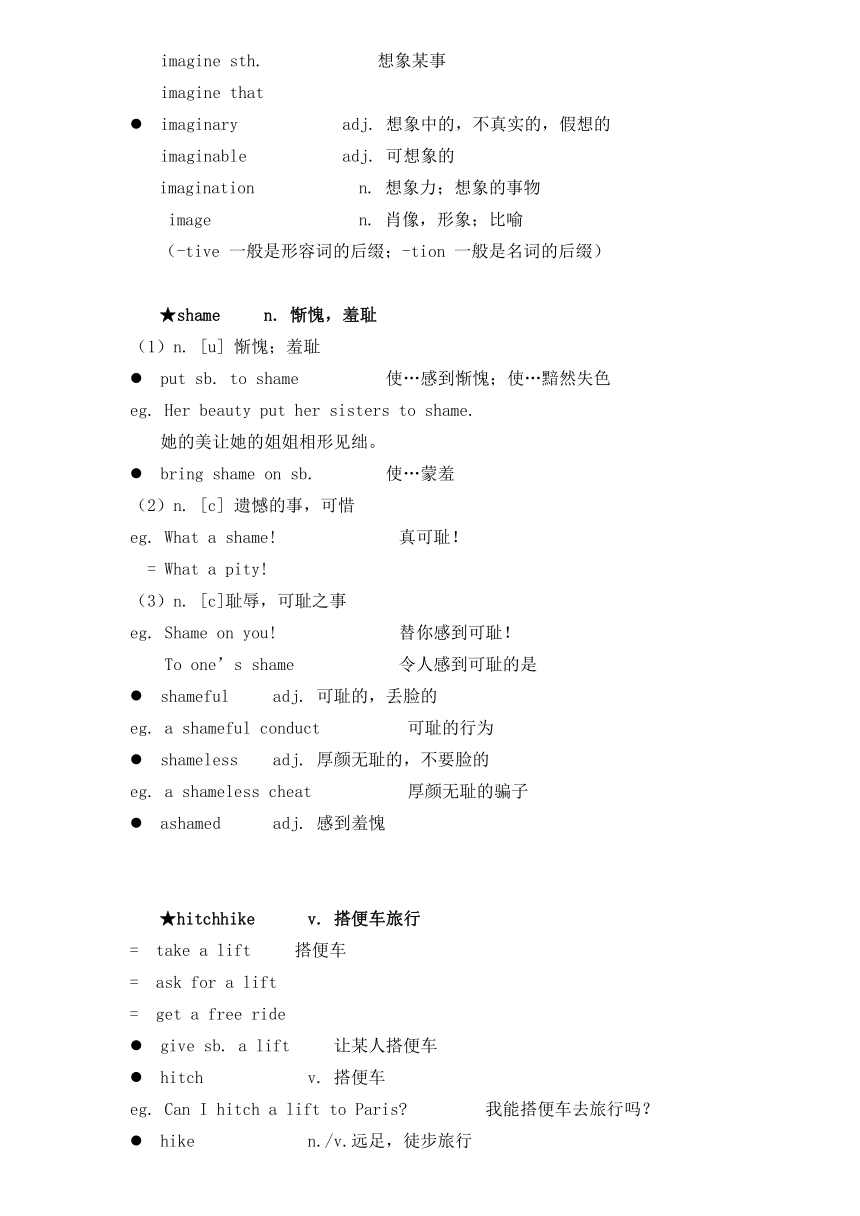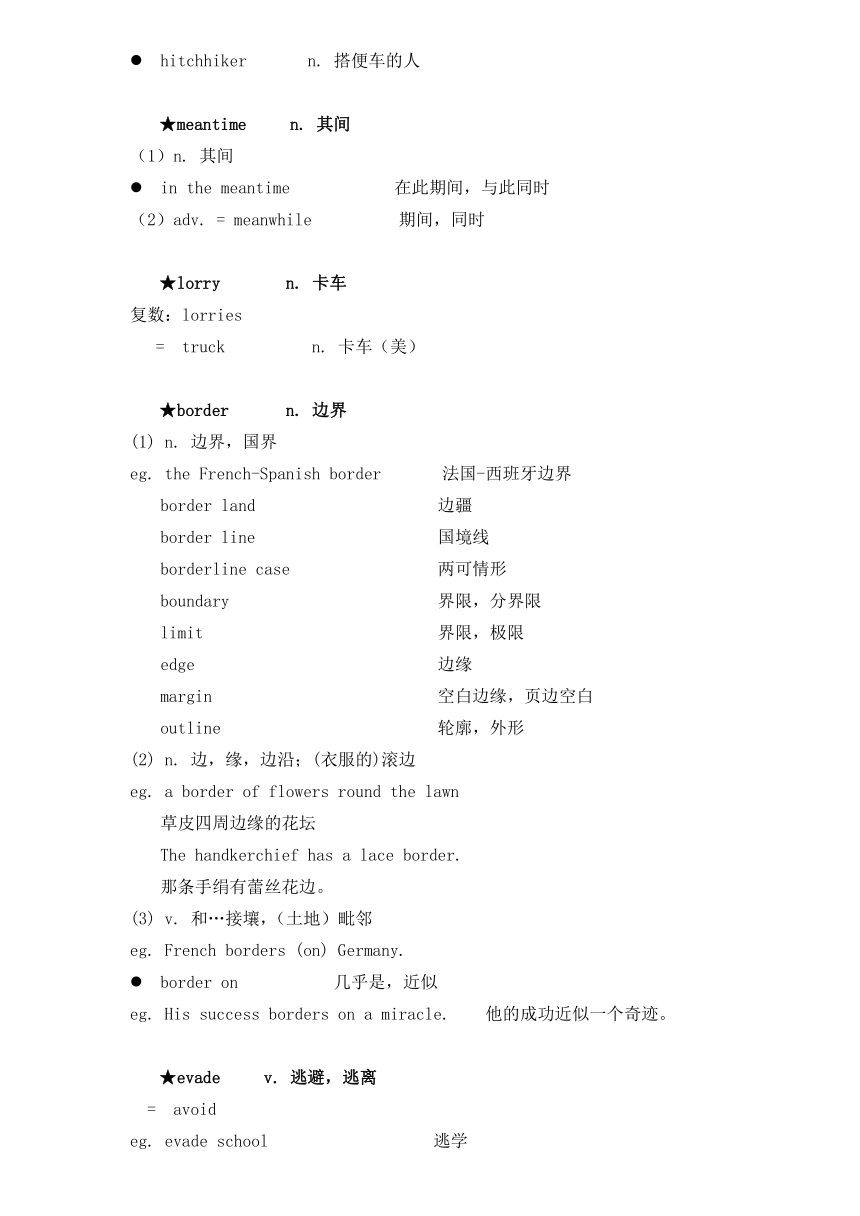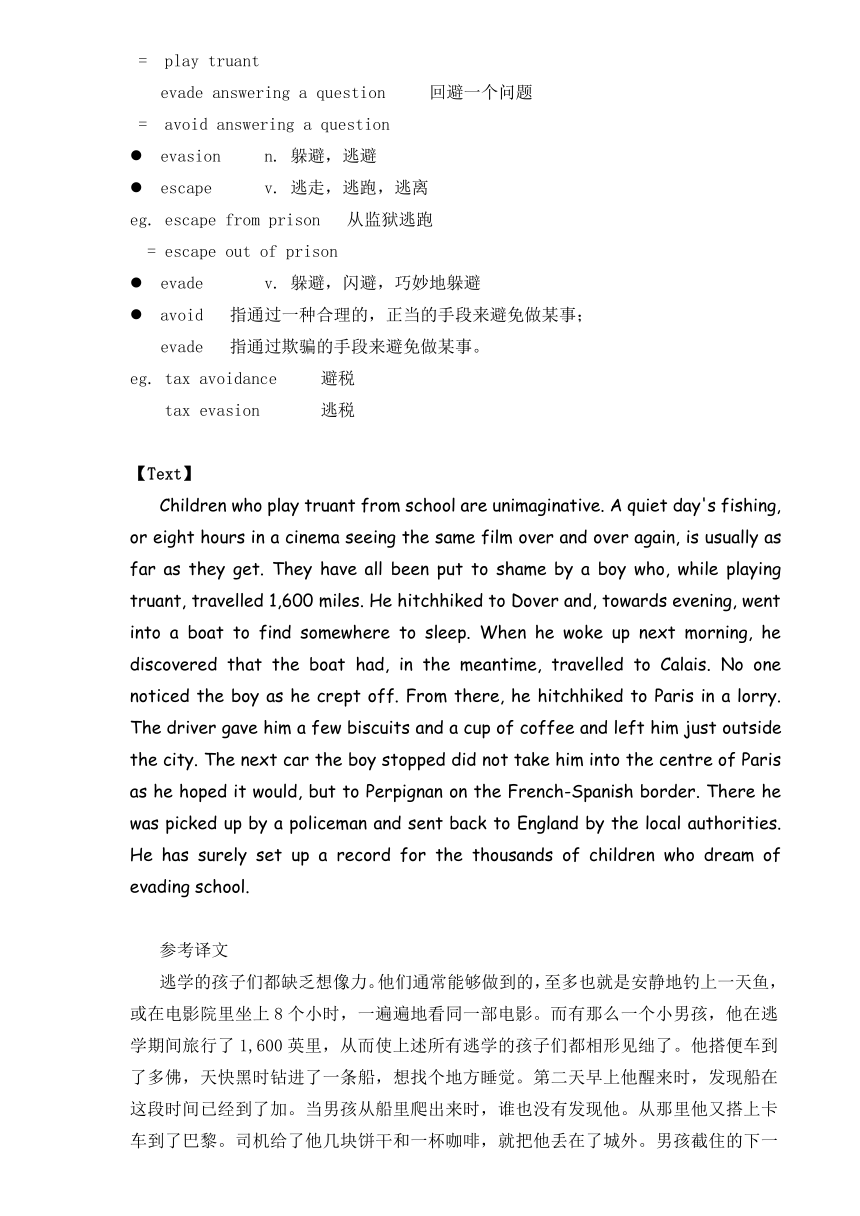新概念英语二册超详讲义笔记Lesson 73 The record-holder 纪录保持者
文档属性
| 名称 | 新概念英语二册超详讲义笔记Lesson 73 The record-holder 纪录保持者 |  | |
| 格式 | docx | ||
| 文件大小 | 34.8KB | ||
| 资源类型 | 教案 | ||
| 版本资源 | 新概念英语 | ||
| 科目 | 英语 | ||
| 更新时间 | 2023-09-26 06:41:22 | ||
图片预览




文档简介
Lesson 73 The record-holder 纪录保持者
【New words and expressions】(9)
record-holder 纪录保持者
truant n. 逃学的孩子
unimaginative adj. 缺乏想像力的
shame n. 惭愧,羞耻
hitchhike v. 搭便车旅行
meantime n. 其间
lorry n. 卡车
border n. 边界
evade v. 逃避,逃离
★record-holder 纪录保持者
record n. 记录 v. 录音,录像
eg. set up a record 创造纪录
= build up a record
= make a record
= create a record
hold a record 保持纪录
break a record 打破纪录
= beat a record
smash a record 大破纪录(smash v. 打碎)
n.+ v.+ er 构词法
tennis player
★truant n. 逃学的孩子,逃学者
play truant 逃学(英)
play hooky 逃学(美)
evade school 逃学
truancy n. 逃学,旷课的(事)
★unimaginative adj. 缺乏想象力的
imaginative adj. 有想象力的
imagine v. 想象,设想
eg. imagine doing sth. 想象做某事
imagine sth. 想象某事
imagine that
imaginary adj. 想象中的,不真实的,假想的
imaginable adj. 可想象的
imagination n. 想象力;想象的事物
image n. 肖像,形象;比喻
(-tive 一般是形容词的后缀;-tion 一般是名词的后缀)
★shame n. 惭愧,羞耻
(1)n. [u] 惭愧;羞耻
put sb. to shame 使…感到惭愧;使…黯然失色
eg. Her beauty put her sisters to shame.
她的美让她的姐姐相形见绌。
bring shame on sb. 使…蒙羞
(2)n. [c] 遗憾的事,可惜
eg. What a shame! 真可耻!
= What a pity!
(3)n. [c]耻辱,可耻之事
eg. Shame on you! 替你感到可耻!
To one’s shame 令人感到可耻的是
shameful adj. 可耻的,丢脸的
eg. a shameful conduct 可耻的行为
shameless adj. 厚颜无耻的,不要脸的
eg. a shameless cheat 厚颜无耻的骗子
ashamed adj. 感到羞愧
★hitchhike v. 搭便车旅行
= take a lift 搭便车
= ask for a lift
= get a free ride
give sb. a lift 让某人搭便车
hitch v. 搭便车
eg. Can I hitch a lift to Paris 我能搭便车去旅行吗?
hike n./v.远足,徒步旅行
hitchhiker n. 搭便车的人
★meantime n. 其间
(1)n. 其间
in the meantime 在此期间,与此同时
(2)adv. = meanwhile 期间,同时
★lorry n. 卡车
复数:lorries
= truck n. 卡车(美)
★border n. 边界
(1) n. 边界,国界
eg. the French-Spanish border 法国-西班牙边界
border land 边疆
border line 国境线
borderline case 两可情形
boundary 界限,分界限
limit 界限,极限
edge 边缘
margin 空白边缘,页边空白
outline 轮廓,外形
(2) n. 边,缘,边沿;(衣服的)滚边
eg. a border of flowers round the lawn
草皮四周边缘的花坛
The handkerchief has a lace border.
那条手绢有蕾丝花边。
(3) v. 和…接壤,(土地)毗邻
eg. French borders (on) Germany.
border on 几乎是,近似
eg. His success borders on a miracle. 他的成功近似一个奇迹。
★evade v. 逃避,逃离
= avoid
eg. evade school 逃学
= play truant
evade answering a question 回避一个问题
= avoid answering a question
evasion n. 躲避,逃避
escape v. 逃走,逃跑,逃离
eg. escape from prison 从监狱逃跑
= escape out of prison
evade v. 躲避,闪避,巧妙地躲避
avoid 指通过一种合理的,正当的手段来避免做某事;
evade 指通过欺骗的手段来避免做某事。
eg. tax avoidance 避税
tax evasion 逃税
【Text】
Children who play truant from school are unimaginative. A quiet day's fishing, or eight hours in a cinema seeing the same film over and over again, is usually as far as they get. They have all been put to shame by a boy who, while playing truant, travelled 1,600 miles. He hitchhiked to Dover and, towards evening, went into a boat to find somewhere to sleep. When he woke up next morning, he discovered that the boat had, in the meantime, travelled to Calais. No one noticed the boy as he crept off. From there, he hitchhiked to Paris in a lorry. The driver gave him a few biscuits and a cup of coffee and left him just outside the city. The next car the boy stopped did not take him into the centre of Paris as he hoped it would, but to Perpignan on the French-Spanish border. There he was picked up by a policeman and sent back to England by the local authorities. He has surely set up a record for the thousands of children who dream of evading school.
参考译文
逃学的孩子们都缺乏想像力。他们通常能够做到的,至多也就是安静地钓上一天鱼,或在电影院里坐上8个小时,一遍遍地看同一部电影。而有那么一个小男孩,他在逃学期间旅行了1,600英里,从而使上述所有逃学的孩子们都相形见绌了。他搭便车到了多佛,天快黑时钻进了一条船,想找个地方睡觉。第二天早上他醒来时,发现船在这段时间已经到了加。当男孩从船里爬出来时,谁也没有发现他。从那里他又搭上卡车到了巴黎。司机给了他几块饼干和一杯咖啡,就把他丢在了城外。男孩截住的下一辆车,没有像他希望的那样把他带到巴黎市中心,而是把他带到了法国和西班牙边界上的佩皮尼昂。他在那儿被一个警察抓住了,之后被当局送回了英国。他无疑为成千上万梦想逃避上学的孩子们创造了一项纪录。
【课文讲解】
1、Children who play truant from school are unimaginative.
who play truant from school 作定语从句修饰children
play truant from school = play truant 逃学
2、A quiet day's fishing, or eight hours in a cinema seeing the same film over and over again, is usually as far as they get.
A quiet day’s fishing, or eight hours in a cinema seeing the same film over and over again是主语; is 是系动词;usually as far as they get是表语成分。
由or连接的句子主语,谓语动词按就近原则,or 后面是eight hours, 时间、金钱的谓语动词都是is
over and over again = again and again 一次又一次,一再地,反复许多次地
as far as +从句 最大程度……,到……程度,就……而言
eg. as far as the eye can reach 就视力所能及
as far as I know 就我所知道的
as far as I concerned 就我所相关的
3、They have all been put to shame by a boy who, while playing truant, travelled 1,600 miles.
who, while playing truant, travelled 1,600 miles作定语从句修饰a boy
while playing truant 当逃学的时候(是个插入式的时间状语,起强调作用)
put…to shame 使……蒙羞,使……相形见绌
4、He hitchhiked to Dover and, towards evening, went into a boat to find somewhere to sleep.
hitchhike to… 搭便车去……
Dover n. 多佛(英国著名的港口)
towards evening 快到晚上时(插入式的时间状语)
towards prep.
表时间接近
eg. towards the end of the game 比赛快结束时
对于,关于
eg. attitude towards sb.
有…的趋势
eg. a distinct tendency towards inflation 通货膨胀的趋势很明显
went into a boat to find somewhere to sleep中的to find …是不定式作目的状语
somewhere to sleep 可以睡觉的地方
(to sleep是不定式作定语用来修饰somewhere)
eg. anything to do/drink 可以做的事/可以喝的东西(这里to do 做定语)
5、When he woke up next morning, he discovered that the boat had, in the meantime, travelled to Calais.
wake up 自己醒来
Calais n. 加来(法国城市)
in the meantime 在此期间(插入语)
No one noticed the boy as he crept off.
notice
v. 注意,留意,看到
eg. notice sb. 注意到某人
notice sb. do sth. 注意到某人做了某事
notice sb. doing sth. 注意到某人正在做某事
notice that/wh (引导that从句或特殊疑问词引导的从句)
n. 注意,注目
eg. attract notice 引人注目
= draw notice
n. 通知,通告
eg. Wait until further notice. 等待进一步的通告。
n. 公告,贴示
eg. post a notice 张贴一张告示
= put up a notice
bring sth. to one’s notice 使某人看见,注意到
notice board 布告栏
creep off = creep away 爬出来
creep into 悄悄混进去,爬进去
creep upon 悄悄地来到
= creep over
creep
vi. 爬行,匍匐,(像爬行似地)慢慢前进
eg. The old car crept along the country road.
A snake crept into the garden while she was writing a letter.
vi. 悄悄地/蹑手蹑脚地走;渐渐产生/出现
eg. We crept upstairs so as not to wake Grandpa.
He noticed that age had crept on him.
7、From there, he hitchhiked to Paris in a lorry. The driver gave him a few biscuits and a cup of coffee and left him just outside the city.
outside the city 在城外
outside prep.
eg. It is outside my business 不关我的事。
8、The next car the boy stopped did not take him into the centre of Paris as he hoped it would, but to Perpignan on the French-Spanish border.
the boy stopped 作定语从句修饰the next car
take … into 带到……
as he hoped it would 像他所希望的那样(as 所引导的是方式状语从句)
as sb. hoped 正如某人所希望的
than sb. expected 比某人所期待的还……
not…but… 不是……而是……
the French-Spanish border 法国与西班牙的边界
(边界地带属于哪个地方由第一个国籍确定)
9、There he was picked up by a policeman and sent back to England by the local authorities.
pick up
拾起,拿起
eg. pick up a coin in the road 在马路上捡起一枚硬币
pick up the telephone 拿起电话,拿起听筒
搭载乘客;驾车去接人
eg. Shall I pick you up at the station 我去车站接你吧?
恢复,使恢复,变好
eg. I believe things will pick up soon. 我相信一切会很快好起来的。
send back to 送回去
the local authorities 地方当局
the school authorities 学校当局
the authorities concerned 有关当局
10、He has surely set up a record for the thousands of children who dream of evading school.
who dream of evading school 梦想逃学的孩子们(作定语从句修饰children)
set up a record for… 为…创一个记录
dream of doing sth.… 梦想做…
【Summary writing 】
A boy who played truant travelled 1,600 miles. He hitchhiked to Dover where he slept in a boat, only to find himself in Calais the next morning. A lorry driver gave him a lift and something to eat, and the boy got off near Paris. He stopped another car but, instead of being taken to Paris, he was taken to Perpignan on the French-Spanish border. After being picked up by a policeman, he was sent home by the local authorities.(80 words)
A boy played truant from school and travelled 1,600 miles. After hitchhiking to Dover, he slept in a boat. The next morning he found himself in Calais, where a lorry driver gave him a lift and something to eat. On getting off near Paris, he stopped another car which did not take him to Paris but to Perpignan on the FrenchSpanish border. There he was picked up by a policeman and sent home by the local authorities.
【Key structures】
简单句、并列句和复合句
简单句:只包含一个主谓结构,而句子各个成分都只由单词或短语表示。
(复习第1课、25课、49课的句型。)
并列句:句子包含有两个或两个以上互不依靠的主谓结构,并列句中的分句通常用一个并列连词来连接。
复合句:包含有两个或更多的主谓结构,其中有一个(或更多的)主谓结构充当句子的某一成分,如句子充当主语、状语、宾语、表语、定语等。
简单句是英语中最小的句子单位,一般有一个限定动词,它有一个主语和一个谓语,但可以用连词and将两个或两个以上的动词合并为一个简单句。根据动词后所使用的不同成分,简单句可有5种基本句型:
① 主语 +动词
② 主语 +动词 +主语补足语:
③ 主语 +动词 +直接宾语:
④ 主语 +动词 +间接宾语+直接宾语
⑤ 主语 +动词 +宾语 +宾语补足语
将几个简单句连接起来构成并列句。在并列句中不存在单独的主句和从属于它的从句;各小句根据上下文的要求按逻辑次序排列,但各小句都同等重要并独立存在。我们常常把并列句中的各小句看成是并列主句。可采用下列任何一种方式构成并列句:
① 用分号
We fished all day; we didn’t catch a thing.
② 用分号,后面跟一个连接副词(短语),如however、above all、in addition、as far as等
We fished all day; however, we didn’t catch a thing.
③ 用并列连词,如and、but、so、yet等,前面常加逗号:
We fished all day, but (we) didn’t catch a thing.
复合句的构成方法可以是把简单句连接在一起,但复合句的各个组成部分并非同等重要(此点与并列句不同),其中总有一个独立小句(或称“主句”)和一个或一个以上的从属小句(或称“从句”);主句往往可以独立存在。复合句的构成方法:
① 用连词将从句与主句连接起来:
If you’re not good at figures, it is pointless to apply for job in a bank.
如果你不擅于计算,向银行求职就毫无意义。
② 用动词不定式或分词结构。它们是非限定性动词,是短语而不是从句,但它们构成复合句(而非简单句)的一部分。 之所以如此是因为它们可以用从句的形式表现出来。
To get into a university you have to pass a number of examinations.
从句可分为:名词性从句;关系/形容词从句;副词从句。
Holiday resorts which are very crowded are not very pleasant.
那些拥挤的度假场所令人感到不很愉快。
Howerver hard I try, I can’t remember people’s names.
【New words and expressions】(9)
record-holder 纪录保持者
truant n. 逃学的孩子
unimaginative adj. 缺乏想像力的
shame n. 惭愧,羞耻
hitchhike v. 搭便车旅行
meantime n. 其间
lorry n. 卡车
border n. 边界
evade v. 逃避,逃离
★record-holder 纪录保持者
record n. 记录 v. 录音,录像
eg. set up a record 创造纪录
= build up a record
= make a record
= create a record
hold a record 保持纪录
break a record 打破纪录
= beat a record
smash a record 大破纪录(smash v. 打碎)
n.+ v.+ er 构词法
tennis player
★truant n. 逃学的孩子,逃学者
play truant 逃学(英)
play hooky 逃学(美)
evade school 逃学
truancy n. 逃学,旷课的(事)
★unimaginative adj. 缺乏想象力的
imaginative adj. 有想象力的
imagine v. 想象,设想
eg. imagine doing sth. 想象做某事
imagine sth. 想象某事
imagine that
imaginary adj. 想象中的,不真实的,假想的
imaginable adj. 可想象的
imagination n. 想象力;想象的事物
image n. 肖像,形象;比喻
(-tive 一般是形容词的后缀;-tion 一般是名词的后缀)
★shame n. 惭愧,羞耻
(1)n. [u] 惭愧;羞耻
put sb. to shame 使…感到惭愧;使…黯然失色
eg. Her beauty put her sisters to shame.
她的美让她的姐姐相形见绌。
bring shame on sb. 使…蒙羞
(2)n. [c] 遗憾的事,可惜
eg. What a shame! 真可耻!
= What a pity!
(3)n. [c]耻辱,可耻之事
eg. Shame on you! 替你感到可耻!
To one’s shame 令人感到可耻的是
shameful adj. 可耻的,丢脸的
eg. a shameful conduct 可耻的行为
shameless adj. 厚颜无耻的,不要脸的
eg. a shameless cheat 厚颜无耻的骗子
ashamed adj. 感到羞愧
★hitchhike v. 搭便车旅行
= take a lift 搭便车
= ask for a lift
= get a free ride
give sb. a lift 让某人搭便车
hitch v. 搭便车
eg. Can I hitch a lift to Paris 我能搭便车去旅行吗?
hike n./v.远足,徒步旅行
hitchhiker n. 搭便车的人
★meantime n. 其间
(1)n. 其间
in the meantime 在此期间,与此同时
(2)adv. = meanwhile 期间,同时
★lorry n. 卡车
复数:lorries
= truck n. 卡车(美)
★border n. 边界
(1) n. 边界,国界
eg. the French-Spanish border 法国-西班牙边界
border land 边疆
border line 国境线
borderline case 两可情形
boundary 界限,分界限
limit 界限,极限
edge 边缘
margin 空白边缘,页边空白
outline 轮廓,外形
(2) n. 边,缘,边沿;(衣服的)滚边
eg. a border of flowers round the lawn
草皮四周边缘的花坛
The handkerchief has a lace border.
那条手绢有蕾丝花边。
(3) v. 和…接壤,(土地)毗邻
eg. French borders (on) Germany.
border on 几乎是,近似
eg. His success borders on a miracle. 他的成功近似一个奇迹。
★evade v. 逃避,逃离
= avoid
eg. evade school 逃学
= play truant
evade answering a question 回避一个问题
= avoid answering a question
evasion n. 躲避,逃避
escape v. 逃走,逃跑,逃离
eg. escape from prison 从监狱逃跑
= escape out of prison
evade v. 躲避,闪避,巧妙地躲避
avoid 指通过一种合理的,正当的手段来避免做某事;
evade 指通过欺骗的手段来避免做某事。
eg. tax avoidance 避税
tax evasion 逃税
【Text】
Children who play truant from school are unimaginative. A quiet day's fishing, or eight hours in a cinema seeing the same film over and over again, is usually as far as they get. They have all been put to shame by a boy who, while playing truant, travelled 1,600 miles. He hitchhiked to Dover and, towards evening, went into a boat to find somewhere to sleep. When he woke up next morning, he discovered that the boat had, in the meantime, travelled to Calais. No one noticed the boy as he crept off. From there, he hitchhiked to Paris in a lorry. The driver gave him a few biscuits and a cup of coffee and left him just outside the city. The next car the boy stopped did not take him into the centre of Paris as he hoped it would, but to Perpignan on the French-Spanish border. There he was picked up by a policeman and sent back to England by the local authorities. He has surely set up a record for the thousands of children who dream of evading school.
参考译文
逃学的孩子们都缺乏想像力。他们通常能够做到的,至多也就是安静地钓上一天鱼,或在电影院里坐上8个小时,一遍遍地看同一部电影。而有那么一个小男孩,他在逃学期间旅行了1,600英里,从而使上述所有逃学的孩子们都相形见绌了。他搭便车到了多佛,天快黑时钻进了一条船,想找个地方睡觉。第二天早上他醒来时,发现船在这段时间已经到了加。当男孩从船里爬出来时,谁也没有发现他。从那里他又搭上卡车到了巴黎。司机给了他几块饼干和一杯咖啡,就把他丢在了城外。男孩截住的下一辆车,没有像他希望的那样把他带到巴黎市中心,而是把他带到了法国和西班牙边界上的佩皮尼昂。他在那儿被一个警察抓住了,之后被当局送回了英国。他无疑为成千上万梦想逃避上学的孩子们创造了一项纪录。
【课文讲解】
1、Children who play truant from school are unimaginative.
who play truant from school 作定语从句修饰children
play truant from school = play truant 逃学
2、A quiet day's fishing, or eight hours in a cinema seeing the same film over and over again, is usually as far as they get.
A quiet day’s fishing, or eight hours in a cinema seeing the same film over and over again是主语; is 是系动词;usually as far as they get是表语成分。
由or连接的句子主语,谓语动词按就近原则,or 后面是eight hours, 时间、金钱的谓语动词都是is
over and over again = again and again 一次又一次,一再地,反复许多次地
as far as +从句 最大程度……,到……程度,就……而言
eg. as far as the eye can reach 就视力所能及
as far as I know 就我所知道的
as far as I concerned 就我所相关的
3、They have all been put to shame by a boy who, while playing truant, travelled 1,600 miles.
who, while playing truant, travelled 1,600 miles作定语从句修饰a boy
while playing truant 当逃学的时候(是个插入式的时间状语,起强调作用)
put…to shame 使……蒙羞,使……相形见绌
4、He hitchhiked to Dover and, towards evening, went into a boat to find somewhere to sleep.
hitchhike to… 搭便车去……
Dover n. 多佛(英国著名的港口)
towards evening 快到晚上时(插入式的时间状语)
towards prep.
表时间接近
eg. towards the end of the game 比赛快结束时
对于,关于
eg. attitude towards sb.
有…的趋势
eg. a distinct tendency towards inflation 通货膨胀的趋势很明显
went into a boat to find somewhere to sleep中的to find …是不定式作目的状语
somewhere to sleep 可以睡觉的地方
(to sleep是不定式作定语用来修饰somewhere)
eg. anything to do/drink 可以做的事/可以喝的东西(这里to do 做定语)
5、When he woke up next morning, he discovered that the boat had, in the meantime, travelled to Calais.
wake up 自己醒来
Calais n. 加来(法国城市)
in the meantime 在此期间(插入语)
No one noticed the boy as he crept off.
notice
v. 注意,留意,看到
eg. notice sb. 注意到某人
notice sb. do sth. 注意到某人做了某事
notice sb. doing sth. 注意到某人正在做某事
notice that/wh (引导that从句或特殊疑问词引导的从句)
n. 注意,注目
eg. attract notice 引人注目
= draw notice
n. 通知,通告
eg. Wait until further notice. 等待进一步的通告。
n. 公告,贴示
eg. post a notice 张贴一张告示
= put up a notice
bring sth. to one’s notice 使某人看见,注意到
notice board 布告栏
creep off = creep away 爬出来
creep into 悄悄混进去,爬进去
creep upon 悄悄地来到
= creep over
creep
vi. 爬行,匍匐,(像爬行似地)慢慢前进
eg. The old car crept along the country road.
A snake crept into the garden while she was writing a letter.
vi. 悄悄地/蹑手蹑脚地走;渐渐产生/出现
eg. We crept upstairs so as not to wake Grandpa.
He noticed that age had crept on him.
7、From there, he hitchhiked to Paris in a lorry. The driver gave him a few biscuits and a cup of coffee and left him just outside the city.
outside the city 在城外
outside prep.
eg. It is outside my business 不关我的事。
8、The next car the boy stopped did not take him into the centre of Paris as he hoped it would, but to Perpignan on the French-Spanish border.
the boy stopped 作定语从句修饰the next car
take … into 带到……
as he hoped it would 像他所希望的那样(as 所引导的是方式状语从句)
as sb. hoped 正如某人所希望的
than sb. expected 比某人所期待的还……
not…but… 不是……而是……
the French-Spanish border 法国与西班牙的边界
(边界地带属于哪个地方由第一个国籍确定)
9、There he was picked up by a policeman and sent back to England by the local authorities.
pick up
拾起,拿起
eg. pick up a coin in the road 在马路上捡起一枚硬币
pick up the telephone 拿起电话,拿起听筒
搭载乘客;驾车去接人
eg. Shall I pick you up at the station 我去车站接你吧?
恢复,使恢复,变好
eg. I believe things will pick up soon. 我相信一切会很快好起来的。
send back to 送回去
the local authorities 地方当局
the school authorities 学校当局
the authorities concerned 有关当局
10、He has surely set up a record for the thousands of children who dream of evading school.
who dream of evading school 梦想逃学的孩子们(作定语从句修饰children)
set up a record for… 为…创一个记录
dream of doing sth.… 梦想做…
【Summary writing 】
A boy who played truant travelled 1,600 miles. He hitchhiked to Dover where he slept in a boat, only to find himself in Calais the next morning. A lorry driver gave him a lift and something to eat, and the boy got off near Paris. He stopped another car but, instead of being taken to Paris, he was taken to Perpignan on the French-Spanish border. After being picked up by a policeman, he was sent home by the local authorities.(80 words)
A boy played truant from school and travelled 1,600 miles. After hitchhiking to Dover, he slept in a boat. The next morning he found himself in Calais, where a lorry driver gave him a lift and something to eat. On getting off near Paris, he stopped another car which did not take him to Paris but to Perpignan on the FrenchSpanish border. There he was picked up by a policeman and sent home by the local authorities.
【Key structures】
简单句、并列句和复合句
简单句:只包含一个主谓结构,而句子各个成分都只由单词或短语表示。
(复习第1课、25课、49课的句型。)
并列句:句子包含有两个或两个以上互不依靠的主谓结构,并列句中的分句通常用一个并列连词来连接。
复合句:包含有两个或更多的主谓结构,其中有一个(或更多的)主谓结构充当句子的某一成分,如句子充当主语、状语、宾语、表语、定语等。
简单句是英语中最小的句子单位,一般有一个限定动词,它有一个主语和一个谓语,但可以用连词and将两个或两个以上的动词合并为一个简单句。根据动词后所使用的不同成分,简单句可有5种基本句型:
① 主语 +动词
② 主语 +动词 +主语补足语:
③ 主语 +动词 +直接宾语:
④ 主语 +动词 +间接宾语+直接宾语
⑤ 主语 +动词 +宾语 +宾语补足语
将几个简单句连接起来构成并列句。在并列句中不存在单独的主句和从属于它的从句;各小句根据上下文的要求按逻辑次序排列,但各小句都同等重要并独立存在。我们常常把并列句中的各小句看成是并列主句。可采用下列任何一种方式构成并列句:
① 用分号
We fished all day; we didn’t catch a thing.
② 用分号,后面跟一个连接副词(短语),如however、above all、in addition、as far as等
We fished all day; however, we didn’t catch a thing.
③ 用并列连词,如and、but、so、yet等,前面常加逗号:
We fished all day, but (we) didn’t catch a thing.
复合句的构成方法可以是把简单句连接在一起,但复合句的各个组成部分并非同等重要(此点与并列句不同),其中总有一个独立小句(或称“主句”)和一个或一个以上的从属小句(或称“从句”);主句往往可以独立存在。复合句的构成方法:
① 用连词将从句与主句连接起来:
If you’re not good at figures, it is pointless to apply for job in a bank.
如果你不擅于计算,向银行求职就毫无意义。
② 用动词不定式或分词结构。它们是非限定性动词,是短语而不是从句,但它们构成复合句(而非简单句)的一部分。 之所以如此是因为它们可以用从句的形式表现出来。
To get into a university you have to pass a number of examinations.
从句可分为:名词性从句;关系/形容词从句;副词从句。
Holiday resorts which are very crowded are not very pleasant.
那些拥挤的度假场所令人感到不很愉快。
Howerver hard I try, I can’t remember people’s names.
同课章节目录
